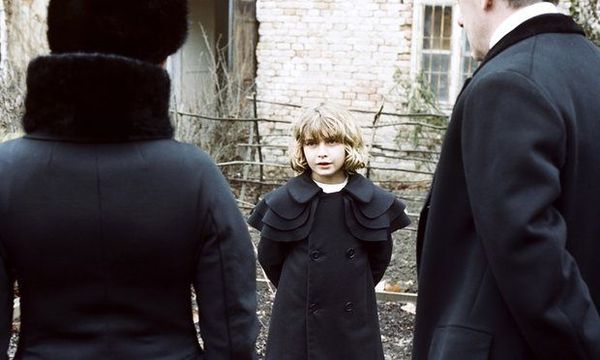 |
| Brady Corbet: 'The thing that’s quite interesting about Tom in the film is that there’s nothing inherently sinister about him in a way. He’s just a bit blank' |
Brady Corbet's The Childhood Of A Leader was released in UK cinemas after Protagonist Pictures stepped in following the announcement that original distributor Metrodome had fallen into insolvency in its planned week of release. The British distribution was handled by Soda Pictures.
The film marks the culmination of 10 years of work for actor-turned-writer/director Corbet. The narrative follows the day-to-day goings on in a home where a young boy (Tom Sweet) lives with his doctrinaire mother (Bérénice Bejo) and diplomat father (Liam Cunningham), who has relocated his family to France while he works on the Treaty of Versailles. The austerity of the boy's relationship with his parents is shown in stark relief to the warmth of his friendship with the family's housekeeper (Yolande Moreau), while the presence of a French tutor (Stacy Martin) and occasional visits from journalist friend Charles (Robert Pattinson in a small but crucial role) further fuel family tensions.
The film is less concerned with straightforward narrative than atmosphere and making the audience think fill in the gaps, with Corbet - who somehow in between his busy acting schedule and private projects also finds time to work as a ghostwriter - saying that he "gets tired of reading screenplays".
"I always made money in my off time writing very conventional material," he adds. "It’s very easy to do and I can do it with my eyes closed so what I’m more interested in is omitting slabs of narrative so that when the film ends it’s still living inside the audience, it’s still with them and there is still enough to reflect on. It’s all there, there’s enough information for everyone to have a narrative through line but I’m much more interested in a certain rhythm, a certain cadence, a certain feeling. It has a little bit more of a poetic logic."
Corbet says that casting Sweet in the role of the fascist-in-the-making was crucial to the feel of the film. He describes the young actor as "extremely kind-hearted, a little bit smart for his own good, naturally - I was a little bit like that as a kid so I'm sympathetic".
Corbet takes an intellectual approach to film and isn't scared to talk about his influences, citing Anselm Kiefer and Margaret Margaret MacMillan (read more about that in the first part of our interview with him). He also reference's Bresson's coming-of-age film Mouchette as a touchstone before moving swiftly on to reference not Sartre - on whose 1939 short story the film is also loosely based - but his fellow French philosopher Albert Camus.
 |
| Brady Corbet: 'I’m more interested in is omitting slabs of narrative so that when the film ends it’s still living inside the audience' |
"I wanted to create this feeling, it’s funny because it comes more from Camus' The Stranger than it does from Jean-Paul [Sartre], I remember when I read The Stranger, what stuck with me was a section when everyone is coming at this character saying, ‘What made you do this? What made you pull the trigger?’ and he’s like, ‘I’d just been in a fight with a young woman I was seeing, it was hot outside, there was sweat on my brow.’ And he started describing just the events in the day that led up to a very bad choice.
"I thought of the film in this way, sort of like, oh, boredom made him do it or, actually, it was the oppression of women, the fact that women didn’t have a voice, it was a few years before women could vote in American and then it was 25 years until they could vote in France. I always feel like in a world run by women – especially good women – none of this would ever have happened.
"For me, the film kind of stops to take a look at everything and everyone that was responsible for inciting such a God-fearing atmosphere. It was such a dreadful, morbid time to be a Christian – it still is. So I think that there’s this strange thing which is the first sort of fanaticism or fandom that we’re introduced to as kids is God or a very Christian notion of God, at least in the West. We come into this world in a way where we are taught that there’s always something or someone bigger and better than us. I think it’s really unhealthy.
"I think that fan culture and the idea that people – especially because I grew up in a way where I was surrounded by a lot of celebrities. I’ve been acting since I was 12, so I grew up working with a lot of famous actors and actresses just from being in show business and knowing a lot of musicians. Now I even know a lot of people in the political sphere and they’re all related, and it’s kind of funny because I’m 27 now and having grown up that way – when I look at a magazine stand and it looks like a year book for me – I know that mythology is absurd. The mythology that we project onto public figures that we don’t know anything about is extremely unhealthy and the first person we do that with, is God, or at least that’s how it was for me.
"So the film definitely suggests that if you taught people to think for themselves and feel for themselves and love one another and respect one another and know that everyone is actually equal and everyone is coming from the same place really as opposed to immediately establishing hierarchies that are supposed to be acknowledged and respected – I’m like, ‘Fuck that.’ That’s not the way that I make movies, that’s not how my set was, it wasn’t like, ‘Hello maestro’."
 |
| Brady Corbet:'I thought it would be really, really interesting to have this sort of Janet Leigh in Psycho effect' |
"It’s really bizarre," says Corbet "There’s a couple of things. First of all, I’m not that connected to the notion of Rob as a celebrity, because I’ve known him for a long time and I didn’t discover him that way. The other thing is that I thought it would be really, really interesting to have this sort of Janet Leigh in Psycho effect, where you have someone who is a public figure and people have their eye on him, he’s interesting, he’s charismatic, he’s compelling, he’s handsome. And I thought, that it would really give weight to the first 20 minutes of the film. So I hired him for all of those reasons. I hired him because the role was written for a young man that was a bit younger than the female character, handsome and English, so I thought of him.
"Anyone who has spent any time with the guy will know that he’s super hard-working and he never complains. I was just talking to the Safdie brothers, who are directing a new film with him [Good Time], and Josh was like, ‘Dude, we were shooting 19 hour days and he didn’t fucking complain once.’ They were just amazed by his work ethic and so am I. I think he and I will work together for a long time."
Corbet isn't sure yet whether Pattinson will feature in his next film Vox Lux yet. "It's a big cast and it’s an ensemble piece and I have to work out what age everyone is in relationship to each other," he says, but the British star is working with Corbet's wife and collaborator Mona Fastvold on her upcoming film The Bleaching Yard.
"It’s a period drama," says Corbet "The source material is from a very famous Norwegian author called Tarjei Vesaas and she’s set it in a whaling community in the 1940s, which is not in the book. It’s really great. We’re making that with Chris Cohen who produced Childhood as well and her producers from The Sleepwalker. This is the first time as a family that we have made two separate projects."
He also says that compared to The Childhood Of A Leader, Vox Lux has been a must swifter project.
"The thing that’s interesting with a first film is that you live with it for a very long time," he says. "My next film, I wrote it quickly, I knew what I wanted to do immediately and it seems like it’ll be made quite quickly. But there’s something a little bit unnerving about that for me because, ‘Have I had enough time to prepare’. But 10 years is too much and it was too long to be focused on these themes. My next film’s not a walk in the park or anything but at least it’s something new. It’s a film quite specifically about the turn of the 21st century to the present. It’s about the rise of a pop star.
"The thing that’s funny is that my last film and this one are very much related because they’re both about the culture of worship. Ultimately, if Childhood has anything particular to lay out – and it’s not really intended as a particularly didactic experience and I think an understandable but incorrect interpretation of the movie is that it has something to say about 2 + 2 = 4 in terms of if you parent in a certain way. The film was never about nature versus nature at any point. The film was specifically designed to avoid simplistic notions of causality. The film was meant to explore the seemingly inconsequential moments in your life that may define your character just as much as a seemingly traumatic turning point.
"I feel like in a strange way that a film just needs to mean something to the person that made it. It’s like a poem so there’s so much there for people to have their interpretations. The most painful thing about making a movie that’s open to interpretation, is that it’s open to misinterpretation, so it’s kind of like, the only thing that ever upsets me. I never have a problem when someone hates the film but I hate when someone hates the film for the wrong reasons, then I get really pissed off. Because it’s one of those things where if the film is dismissed as a moral tale, which I would never participate in the crafting of a moral tale, so I’m like, what movie did you see?
"I think that has much more to do with viewers who want to assume something. That has to do with their expectations not to do with what the film is emitting. It’s a funny thing but I’ve got a bit better at letting it wash over me. It was not meant to be a history lesson or at all didactic. It’s supposed to be a mourning call for the events that define the 20th century that somehow it would touch upon everything that was beautiful and devastating about the century."
The Childhood Of Leader is in cinemas in the UK now. For more about the film, visit the Facebook page.
Read the first part of our interview with Brady Corbet, on history repeating itself and the look, score and inspiration for the film.





















